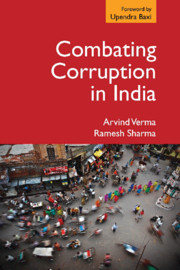3 - Etiology of Corruption in India
from Part I - Corruption in India
Published online by Cambridge University Press: 13 November 2018
Summary
In this section, we look into the history of bribery and other corrupt practices in India. In particular, we present some criminological perspectives that identify the facilitators of corrupt practices in public and political establishments. We suggest that the bureaucratic system with roots in colonial governance bears no local responsibility and functions in secrecy. Moreover, the extensive discretion exercised by public officials is another factor that promotes corruption and misuse of authority. We illustrate this by examining the nature of corrupt practices in the police department and civil administration. We further assert that political shenanigans and criminality is perhaps the biggest cause of corruption in the country. We highlight several cases of political corruption and also examine the role of illegal financing of elections that catalyzes corruption in the country. We argue that the control of the state over natural resources and the lack of transparency in distributing for private exploitation is a major path to corruption. We add that the electronic revolution has also helped build long distance associations that further assist in coordinating actions to siphon public funds. Online banking has opened new avenues wherein financial institutions have become the playground of corruption. This chapter also presents some criminological perspectives to explain the means by which corruption occurs and hides its traces.
Introduction
In independent India, corruption made its presence felt during the period of the Nehru government itself. Starting from the Mundra affairs of 1957 that involved a sum of 1.24 Crores (about USD 3.2 million at the time) the current corruption scandals have reached staggering sums of ‘$40 billion in revenues lost from the crooked sale of 2G telecoms licenses and over $40 billion stolen in Uttar Pradesh alone from schemes subsidizing food and fuel for the poor’ (Economist, 2011). Independent India started with a socialist stance and the founding fathers led by Nehru saw no problem with the state controlling the commanding heights of economy. Many ministers in Nehru's cabinet were corrupt but the government went out of its way to shield its ministers (Report on Public Administration, Planning Commission, Government of India 1951).
Information
- Type
- Chapter
- Information
- Combating Corruption in India , pp. 44 - 72Publisher: Cambridge University PressPrint publication year: 2018
